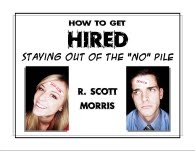Q: Has a thank you letter from an interviewee ever made you hire her? How about a candidate calling HR to "check how the search is going"?
Thank you notes are another gauge of a candidate's interest in working at a particular job. However, just as some people write them more than others, some interviewers will value them more than others.
How can you tell if your interviewer will respond to a letter? If a person gives you a business card, it may be a sign that they value this form of recognition. I personally never put much weight on them.
I don't have any direct experience with the second question, but common sense would suggest that it probably won't do much good to "check in" with the HR department. The phrase, "don't call us. We'll call you" is probably a worthwhile rule of thumb.
Are you wondering How to Get Hired? Join the discussion on my Facebook Group Polished and ask me anything you have ever wondered about resumes, cover letters, interviews, and job hunting!
Q: How should we approach alumni? How direct can we be about looking for an internship or job?
Alumni can be a great source; they can help you understand the skills necessary for certain jobs and the culture of different firms. But, be careful with a direct sales pitch.
Wanting to learn from the alum and cultivating a relationship are fine, but you will rarely get anywhere by asking directly for a job or reference. To get to this point, you cannot be direct. If they like you and think you have potential, they might just be willing to recommend you. Focus on cultivating a relationship and let things evolve as they may.
Are you wondering How to Get Hired? Join the discussion on my Facebook Group Polished and ask me anything you have ever wondered about resumes, cover letters, interviews, and job hunting!
Q: Why do employers care about cover letters? What can I communicate with a cover letter that isn't on my resume?
A cover letter serves a number of specific purposes for an employer.
First, it is an indication of how interested the prospective employee is in a particular job. Anybody can attach a resume to an email, but a cover letter takes time. It can help provide insight into one of the most important questions an employer must answer: "Does she really want to work for me?"
I often will place a specific request in a job description, such as "please describe a team experience where you had to overcome a particular problem". I generally would really care to hear the response, but more importantly, I want to see which candidates put out the extra effort to craft an individual letter to address this issue. This has proven to be a great weeding out process!
Second, a cover letter can create an important narrative about one's qualifications and possible impact in a particular role. It better expresses character traits and passions than a resume. Lastly, it can provide insight into a candidate's communication skills and judgment.
For you, the writer, it gives you the opportunity to frame your skills and experiences in a way that is most favorable for you. Put in the extra effort. It is worth it.
Are you wondering How to Get Hired? Join the discussion on my Facebook Group Polished and ask me anything you have ever wondered about resumes, cover letters, interviews, and job hunting!
Q: Is the "tell me about yourself" interview opener a make-or-break question, or more of a 5 minute warm-up where I can share where I was born, my story, and what I am interested in?
Well, first off, you should never spend 5 minutes answering any question. You should practice answering questions in short, concise statements that last no longer than 1 to 2 minutes.
With regard to the "tell me about yourself" question, many interviewers like to start out with a general question like this to allow you to steer the conversation in a direction that you want. You should take advantage of this, and highlight some key points from your background that accentuate your strengths and invite your interviewer to ask follow-up questions.
However, make sure you answer the question as it is asked. If your interviewer asks you to summarize your resume in a couple of minutes, make sure you answer the general question as you move from strength to strength.
It is not a "make-or-break" question. It is a "break the ice" question, and an opportunity for you to get comfortable with the interview process. Learn to use it to your advantage.
By the way, I am assuming you are kidding about going back to when you were born, but just to be clear, you should focus on relevant experiences that will show your interviewer that you will perform well in the job at hand. A little bit of local color is fine, but don't expand the question to too much detail, or you will lose the interviewer's attention and turn an advantage into a disadvantage.
Are you wondering How to Get Hired? Join the discussion on my Facebook Group Polished and ask me anything you have ever wondered about resumes, cover letters, interviews, and job hunting!












